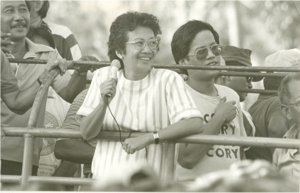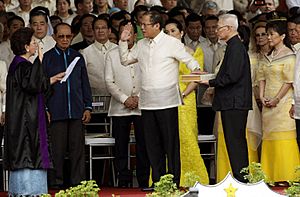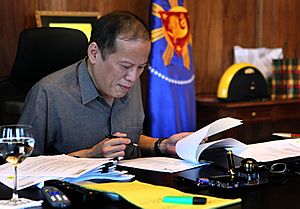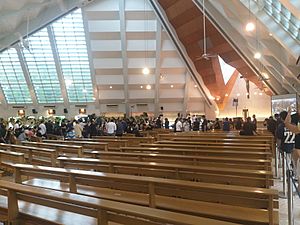Benigno Aquino III facts for kids
Quick facts for kids
Benigno S. Aquino III
KGCR
|
|
|---|---|
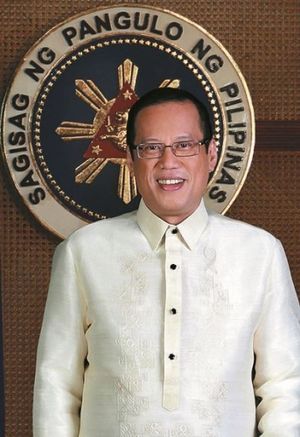
Official portrait, 2010
|
|
| 15th President of the Philippines | |
| In office June 30, 2010 – June 30, 2016 |
|
| Vice President | Jejomar Binay |
| Preceded by | Gloria Macapagal Arroyo |
| Succeeded by | Rodrigo Roa Duterte |
| Secretary of the Interior and Local Government | |
|
Officer-In-Charge
(in concurrent capacity as President of the Philippines) |
|
| In office June 30, 2010 – July 9, 2010 |
|
| Preceded by | Ronaldo Puno |
| Succeeded by | Jesse Robredo |
| Senator of the Philippines | |
| In office June 30, 2007 – June 30, 2010 |
|
| Senate President |
|
| Deputy Speaker of the House of Representatives of the Philippines | |
| In office November 8, 2004 – February 21, 2006 |
|
| Preceded by | Raul M. Gonzalez |
| Succeeded by | Simeon Datumanong |
| Member of the Philippine House of Representatives from Tarlac's 2nd district | |
| In office June 30, 1998 – June 30, 2007 |
|
| Preceded by | Jose Yap |
| Succeeded by | Jose Yap |
| Personal details | |
| Born |
Benigno Simeon Cojuangco Aquino III
February 8, 1960 Sampaloc, Manila, Philippines |
| Died | June 24, 2021 (aged 61) Quezon City, Philippines |
| Resting place | Manila Memorial Park – Sucat, Parañaque, Philippines |
| Political party | Liberal |
| Parents | |
| Relatives |
|
| Alma mater | Ateneo de Manila University (A.B.) |
| Signature |  |
| Nicknames | PNoy, Noynoy |
Benigno Simeon Cojuangco Aquino III (February 8, 1960 – June 24, 2021) was a Filipino politician. He was often called Noynoy Aquino or PNoy. He served as the 15th president of the Philippines from 2010 to 2016. During his time as president, the country's economy grew a lot. The Philippines was even called a "Rising Tiger" economy. He took a strong stance on international issues, especially regarding the South China Sea. His government filed a case against China, and the court ruled in favor of the Philippines. His term ended on June 30, 2016.
Contents
Early Life and Education
Benigno Simeon Cojuangco Aquino III was born on February 8, 1960, in Sampaloc, Manila. He was the third of five children. His father was Benigno Aquino Jr., a senator. His mother was Corazon Cojuangco, who later became president. He had four sisters, including the famous actress Kristina Bernadette.
Noynoy went to Ateneo de Manila University in Quezon City. He studied there from elementary school all the way through college. In 1981, he earned a degree in economics.
After college, from 1993 to 1998, he worked at Central Azucarera de Tarlac. This was a sugar refinery owned by his family. He started as an executive assistant and later became a manager.
Becoming a Politician
Noynoy Aquino came from a family of politicians. His great-grandfather, Servillano Aquino, was a delegate to the Malolos Congress. His paternal grandfather, Benigno Aquino Sr., was Speaker of the National Assembly. His maternal grandfather, José Cojuangco, was also a member of the House of Representatives. And, of course, his parents were President Corazon Aquino and Senator Benigno "Ninoy" Aquino Jr.
Noynoy was a member of the Liberal Party. He held several important roles within the party. He served as a member of the House of Representatives from 1998 to 2007. He was also a deputy speaker from 2004 to 2006. From 2007 to 2010, he was a Senator.
In September 2009, after his mother passed away, he announced he would run for president. He won the election and became the 15th president. He was sworn into office on June 30, 2010.
His Time as President (2010–2016)
Benigno Aquino III became president on June 30, 2010. People often called him PNoy during his presidency. He was the first president to live in the Bahay Pangarap instead of the Malacañang Palace.
One of his first actions was to form a truth commission. This group would investigate claims of corruption from the previous administration. He took his oath of office at the Quirino Grandstand in Rizal Park, Manila.
In July 2010, President Aquino gave his first State of the Nation Address (SONA). He talked about improving the education system. He wanted to change it to a 12-year basic education cycle, known as K–12 education. He gave his final SONA in July 2015. He spoke about the country's economic improvements and social programs.
Domestic Policies
No Wang-Wang Policy
During his first speech as president, Aquino started the "no wang-wang" policy. Wang-wang is a Filipino word for blaring sirens. This policy meant that only emergency vehicles and certain government officials could use sirens. Even as president, Aquino chose not to use sirens. This was to set an example for everyone.
Peace in Mindanao
President Aquino worked to bring peace to Mindanao. He restarted talks with the Moro Islamic Liberation Front (MILF). This group was fighting for self-rule in the region. In 2012, they signed the Framework Agreement on the Bangsamoro. This agreement aimed to replace the old autonomous region with a new one. In 2014, a "final peace agreement" was signed. This led to the creation of the Bangsamoro Basic Law.
In 2015, there was a police operation called the Mamasapano clash. Many police officers died. President Aquino was later cleared of all charges related to this incident.
Education Reforms
Aquino brought big changes to the Philippine education system. In 2013, he signed the Enhanced Basic Education Act. This law added two years to basic education, creating the Senior High School stage. This was done because the Philippines was one of the few countries with only a 10-year basic education program. Some people worried about the extra costs for families and the need for more classrooms and teachers.
Foreign Policy
President Aquino was known for his strong approach to China. This was especially true regarding the South China Sea. In 2013, his administration filed a case against China. This case was heard by the Permanent Court of Arbitration. In 2016, the court ruled that China's claims over the entire sea were not valid. China, however, did not accept this decision. Aquino also started using the term "West Philippine Sea" in 2012. This refers to parts of the South China Sea that the Philippines claims.
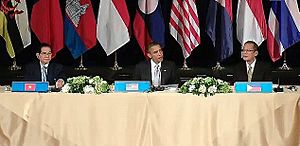
After the Presidency (2016–2021)
After his term ended, Aquino returned to his parents' home in Quezon City. He mostly stayed out of the public eye. However, he did attend some public events. In November 2016, he joined protests against the burial of former president Ferdinand Marcos. In February 2017, he also joined protests to remember the People Power Revolution.
Illness and Death
In his later years, there were concerns about Aquino's health. In 2019, he was reported to have pneumonia. He also suffered from hypertension (high blood pressure) and diabetes. He often needed medical treatment for his conditions.
On June 24, 2021, Aquino was found unconscious at his home. He was taken to Capitol Medical Center in Quezon City. He was pronounced dead at 6:30 a.m. The cause of death was kidney disease, which was caused by his diabetes. He had been planning to have a kidney transplant.
His body was cremated on the same day. His ashes were buried next to his parents at the Manila Memorial Park in Parañaque. This made him the first Philippine president to be cremated. Public viewings and Masses were held at the Church of the Gesù at his old university.
After his death, President Rodrigo Duterte declared a ten-day period of national mourning. All national flags were flown at half-mast to show respect.
Honors and Awards
Benigno Aquino III received many honors during his life.
Foreign Honors
 Japan: Grand Cordon of the Supreme Order of the Chrysanthemum (2015)
Japan: Grand Cordon of the Supreme Order of the Chrysanthemum (2015) Sovereign Military Order of Malta: Collar of the Knightly Order pro merito Melitensi (2015)
Sovereign Military Order of Malta: Collar of the Knightly Order pro merito Melitensi (2015) Indonesia: First Class of the Star of the Republic of Indonesia (2014)
Indonesia: First Class of the Star of the Republic of Indonesia (2014) Kuwait: Collar of the Order of Mubarak the Great (2012)
Kuwait: Collar of the Order of Mubarak the Great (2012) Qatar: Collar of the Order of Independence (2012)
Qatar: Collar of the Order of Independence (2012)
National Honors
Honorary Degrees
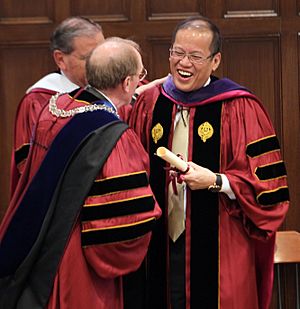
- Fordham University – Honorary doctorate in Economics (2011)
- Centro Escolar University – Honorary doctorate in Economics (2012)
- Kasetsart University – Honorary doctorate in Economics
- University of the Philippines Diliman – Honorary doctorate in Law
- Sophia University – Honorary doctorate in Law (2014)
- Tarlac State University – Honorary doctorate in Humanities (2015)
- Loyola Marymount University – Honorary Doctor of Humane Letters degree (2016)
Recognitions
- Named one of the 100 Most Influential People in the World in 2013 by Time magazine.
- Received a City Council Resolution welcoming him to Chicago from Mayor Rahm Emanuel (2015).
Images for kids
See also
 In Spanish: Benigno Aquino III para niños
In Spanish: Benigno Aquino III para niños


